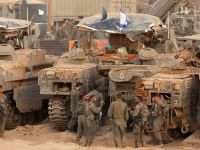The US has closed off the primary supply route Iran has used for almost 20 years to fly arms and other material support to Syria for "extremist groups" in Lebanon, according to a report by the Los Angeles Times on Sunday, quoting US and Mideast officials.
That success, however, has been countered by Iran's escalating involvement with extremist groups -- primarily Hamas, Islamic Jihad and Hizbollah -- which are determined to halt the US-brokered Mideast peace process, said the report.
Iran's role during the past seven months has grown to levels not witnessed in a decade, US officials say.
In an attempt to curtail Iran's activities, the US persuaded Turkey to revoke permission for Iran to fly planes to Syria over Turkish airspace. Since 1982, when Iran first deployed its Revolutionary Guards in Lebanon after Israel invaded the south of the country, Tehran had supplied its troops and allies by flying goods to Syria and transporting them by road into Lebanon's eastern Bekaa Valley.
At a peak in the mid-1990s, the US officials claimed, Iran flew 747 jumbo jets with weapons and other material to Damascus, the Syrian capital, as many as three times a week, although the number of flights had diminished in recent years to once a week.
Turkey's decision, which officials disclosed only reluctantly last week, has left Iran with difficult or costly alternatives. Iraq is off-limits because of the Western-imposed "no-fly" zones in the north and south, while most Arabian Gulf states and Jordan do not want to become regular routes.
Turkey agreed to revoke Iran's air rights last fall after Israel withdrew in May from Lebanon -- a point when many countries in the region hoped the last militias operating in Lebanon would end their militant activities, US officials say. The Turkish government is also not enthusiastic about Hizbollah’s wide reach outside Lebanon and its support for other militant Islamic groups.
Since the cutoff, some Iranian supplies have managed to reach Syria via other land, sea and circuitous air routes. However, Tehran has been unable to find a regular new air corridor, the officials told the paper.
Washington has been pressing other countries besides Turkey to not cooperate with Iran, also with some success, the LA Times continued.
"It was a huge victory for us to get Turkey to shut off access in a political sense too. Turks were no longer willing to turn a blind eye on Iran's terrorism," said a US source involved in the issue, who asked to remain anonymous because of diplomatic sensitivity.
"Iran has managed to smuggle material in through other routes, but they've lost the easiest and fastest way.”
At the same time, however, Tehran has been stepping up its assistance to groups bent on ending any progress toward peace between Israel and the Palestinians.
Last week, Tehran hosted Palestinian resistance groups and international figures in a two-day conference to show support for the Palestinian Intifada.
The annual State Department report on terrorism for 2000 released last week claims that Tehran is already the top state sponsor of terrorism. But US officials claim that the role has become more prominent in recent months.
"Iran has become more active since late last fall. The increase has been pretty steady and pretty intense," said a well-placed US official who also asked to remain anonymous for diplomatic reasons, according to the paper.
Iran on Tuesday rejected the US charges and said that Washington, as a key backer of Israel, had no right to criticize Tehran's policies, reported the official Iranian news agency IRNA on Tuesday.
"The US government, which itself is one of the supporters of Israeli state terrorism, is not in any position to judge others and should abandon its unconditional support for the Zionist regime," said foreign ministry spokesman Hamid-Reza Asefi, cited by the paper.
Arab officials claim that Iran's heightened operational role has both fueled Islamic militancy and undermined progress achieved by the US in the Arab-Israeli peace process since 1993.
Iran has also escalated its involvement with militant groups in politically fragile Jordan to alarming levels, they allege – Albawaba.com
© 2001 Al Bawaba (www.albawaba.com)







